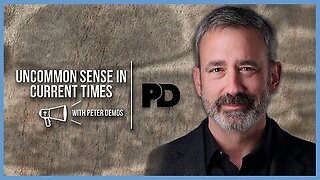Premium Only Content

13 Simple Beginner Tips About Money
For many of us, money is a difficult subject to talk about. We may not like to admit that we don't have as much savings as we'd like, or that we're struggling to make ends meet. However, money is an important part of our lives, and it's important to be honest about our finances. That's why we've put together a few money tips to help you get on the right track. In this video, we’ll cover 13 beginner money tips.
1: Track spending
By knowing where your money is going, you can make adjustments to ensure that your finances are on track. This doesn't mean that you need to become a penny-pincher overnight; rather, it's about being aware of your spending patterns and making tweaks where needed. For example, if you find that you're spending too much on nights out, you might cut back on going out for drinks and instead focus on cooking at home. Or if you're shelling out too much for car repairs, you might consider trading in your car for a more reliable model. Whatever your financial goals may be, tracking your spending is a helpful way to achieve them.
2: Pay yourself first
The old adage "pay yourself first" is sage advice that can help you achieve financial security. The concept is simple: each time you receive income, set aside a portion for savings and investment before paying bills or making purchases. By "paying yourself first," you prioritize your long-term financial goals over short-term spending needs. This discipline can be difficult to maintain, but it is essential for building wealth over time. One way to make it easier is to set up automatic transfers from your paycheck into a savings or investment account. This way, you'll never even see the money and you'll be less tempted to spend it. Paying yourself first may require some adjustments to your budget, but it is a proven strategy for achieving financial security.
3. Utilize a 401(k)
Employees who are offered a 401(k) plan through their employer should take advantage of this benefit. A 401(k) is a retirement savings plan that allows employees to set aside money from their paycheck into a tax-deferred account. Employers may also offer to match a certain percentage of employee contributions. This employer match is essentially free money, so employees should make sure to contribute at least enough to receive the full match. Employees who are not eligible for a 401(k) should consider other retirement savings options, such as an individual retirement account (IRA). However, a 401(k) typically offers more flexible withdrawal options and lower fees than an IRA, so it is generally the better choice for employees who are eligible.
4. Pay taxes
Paying taxes is a necessary part of being a responsible citizen. However, it is also important to be smart about how you pay your taxes. There are a number of ways to minimize your tax liability, and it is worth taking the time to learn about them. Some simple strategies include claiming deductions and credits that you are entitled to, and investing in tax-advantaged accounts like IRAs and 401(k)s. By taking advantage of these opportunities, you can ensure that you are paying your fair share of taxes while also keeping more of your hard-earned money.
5. Utilize the stock market
Many people view the stock market as a risky investment, but with the right strategy, it can be a safe and profitable way to grow your money. One of the key benefits of investing in stocks is that it offers the potential for high returns. Over time, the stock market has consistently outperformed other investments, such as bonds and real estate. In addition, stocks are a liquid investment, which means that you can easily buy and sell shares without incurring large fees. Finally, by diversifying your portfolio across different sectors and industries, you can minimize your risk and maximize your chances of success. When done correctly, investing in stocks can be a great way to build your wealth over time.
6 . Have an emergency fund
Having an emergency fund is important for many reasons. It can help you cover unexpected expenses in a pinch, and can also provide a buffer if you experience a loss of income. Additionally, having an emergency fund can help you avoid going into debt if an unexpected bill pops up.
7. Pay credit card balance
There are a few key reasons to pay off your credit card balance in full every month. First, it saves you money on interest charges. When you carry a balance, you are charged interest on that balance. The higher your interest rate, the more you will pay in interest charges. Second, paying off your balance in full every month shows creditors that you are a responsible borrower. This can help you qualify for lower interest rates in the future. Finally, paying off your balance in full every month helps you avoid late fees and other penalties. These fees can add up quickly, and they can damage your credit score.
-
 1:32:34
1:32:34
Glenn Greenwald
9 hours agoThe Future of Gaza With Abubaker Abed; Journalist Sam Husseini On His Physical Expulsion From Blinken’s Briefing & Biden’s Gaza Legacy | System Update #391
95.1K73 -
 1:34:48
1:34:48
Roseanne Barr
12 hours ago $19.92 earnedWe are so F*cking Punk Rock! with Drea de Matteo | The Roseanne Barr Podcast #83
80.5K50 -
 1:08:20
1:08:20
Man in America
13 hours ago🇨🇳 RedNote: A CCP Trojan Horse Deceiving Americans? w/ Levi Browde
35.1K33 -
 3:55:11
3:55:11
I_Came_With_Fire_Podcast
16 hours agoTrump SABOTAGE, LA FIRE CHIEF SUED, and BIDEN’S LAST F-U!
21.8K7 -
 2:59:47
2:59:47
Joker Effect
7 hours agoUkraine in a video game? Hardest thing I have done. S.T.A.L.K.E.R.2 Heart of Chornobyl,
88.6K4 -
 1:15:22
1:15:22
Flyover Conservatives
1 day agoEczema, Brain Fog, B.O., and Gas… Eating Steak and Butter Creates Ultimate Health Hack - Bella, Steak and Butter Gal | FOC Show
66.9K3 -
 51:58
51:58
PMG
11 hours ago $2.62 earned"Can the Government Learn from Elon Musk’s 70% Labor Cut? A Deep Dive into Inefficient Agencies"
42.9K1 -
 6:39:15
6:39:15
Amish Zaku
10 hours agoRumble Spartans #10 - New Year New Maps
37.4K2 -
 1:04:58
1:04:58
In The Litter Box w/ Jewels & Catturd
1 day agoNo Tax On Tips! | In the Litter Box w/ Jewels & Catturd – Ep. 722 – 1/17/2025
155K32 -
 5:35:39
5:35:39
Dr Disrespect
17 hours ago🔴LIVE - DR DISRESPECT - WARZONE - CRAZY CHALLENGES
175K34